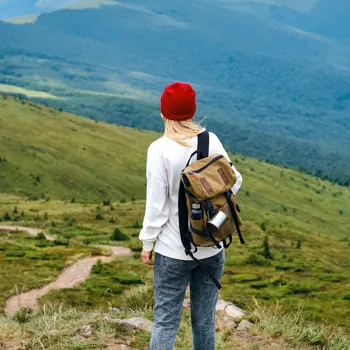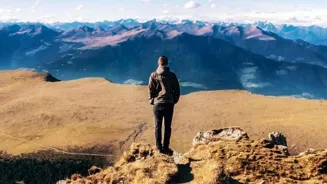Embrace solo travel for a rewarding adventure. Discover 7 essential tips for a safe and enjoyable journey alone
Are you itching to explore India or even the world, but finding it difficult to coordinate
with friends and family? Maybe the answer is to embrace solo travel!

The idea of venturing out on your own can feel a bit daunting, especially if you are new to it, but with a little planning and common sense, it can be an incredibly rewarding and liberating experience.
You get to set your own pace, choose your own adventures, and truly discover yourself along the way. This article will give you practical advice to ensure your solo trip is both safe and enjoyable, allowing you to create memories that will last a lifetime.
It's all about being smart, informed, and open to the amazing possibilities that await you on the open road (or skies!).
Research Your Destination Thoroughly.
Before you even pack your bags, dedicating time to understanding your chosen destination is important. Look into local customs and traditions. Knowing basic etiquette can help you avoid unintentional offence and make interactions with locals smoother. Also, be aware of any specific laws or regulations that might be different from what you are used to back home. This could include things like dress codes in religious places, rules about public displays of affection (keep it simple!), or even restrictions on photography in certain areas. A little bit of research goes a long way in making you feel more confident and respectful in your new surroundings. Safety is also paramount so identify safe and unsafe areas ahead of time. Check travel advisories from your government and read online forums where other travellers share their experiences. Note down emergency contact numbers, including the local police, ambulance, and the Indian embassy or consulate in the country you are visiting.
Share Your Itinerary with Someone You Trust.

While you're embracing independence, it's vital to stay connected with someone back home. Before you leave, create a detailed itinerary that includes your flight information, accommodation details (hotel names, addresses, phone numbers), planned activities, and transportation methods. Share this itinerary with a trusted friend or family member and agree on a check-in schedule. This could be a daily WhatsApp message, a quick phone call every other day, or even just a simple email. If you deviate from your plan, be sure to let your contact person know. This way, someone will be aware of your whereabouts and can raise the alarm if they don't hear from you as expected. Consider using a travel tracking app that allows you to share your location in real time with your designated contact. These apps can provide an extra layer of security and peace of mind, especially when venturing into unfamiliar territory. Don't underestimate the power of letting someone know where you are – it's a simple step that can make a big difference in your safety.
Pack Smart and Light.
Resist the urge to overpack! Lugging heavy suitcases around unfamiliar streets can make you an easy target for petty theft and can also be simply exhausting. Instead, focus on packing essentials and versatile clothing items that can be mixed and matched. Invest in a lightweight, comfortable backpack or suitcase with sturdy wheels. When it comes to clothing, choose fabrics that are easy to wash and dry quickly. Think about the climate of your destination and pack accordingly. Don't forget essential medications, a small first-aid kit, a universal adapter (if travelling internationally), and a portable charger for your phone. Consider packing a decoy wallet with a small amount of cash to hand over if you are ever confronted by a thief. This can help you avoid losing your actual wallet and identification. Leave valuable jewellery and expensive electronic gadgets at home – the less you have to worry about, the more you can relax and enjoy your trip.
Trust Your Instincts.
This might sound like a cliché, but it is genuinely one of the most important things to remember when travelling alone. If a situation feels uncomfortable or suspicious, don't hesitate to remove yourself from it. Whether it's a person who is making you feel uneasy, a place that seems unsafe, or an offer that sounds too good to be true, trust your gut feeling. Don't worry about being polite or offending anyone – your safety is the priority. Learn to say "no" firmly and confidently. If someone is being persistent, don't be afraid to walk away or seek help from someone you trust, like a hotel employee or a shopkeeper. Remember, you are in control of your own journey, and you have the right to feel safe and comfortable at all times. Developing a strong sense of awareness and listening to your intuition is key to navigating unfamiliar situations and avoiding potential dangers.
Be Aware of Your Surroundings.

Pay attention to what's happening around you, especially in crowded places like markets, train stations, and tourist attractions. Avoid walking alone late at night in poorly lit areas. If you must walk at night, stick to well-lit, busy streets and consider taking a taxi or auto-rickshaw. Keep your valuables out of sight – don't flash expensive jewellery or gadgets. Hold your bag securely and be wary of pickpockets. When using ATMs, choose machines in well-lit, public areas and shield the keypad when entering your PIN. Be cautious when accepting drinks or food from strangers. It's always best to buy your own drinks and keep an eye on them. Avoid getting overly intoxicated, as this can impair your judgment and make you more vulnerable to scams and theft. Being aware of your surroundings is not about being paranoid; it's about being responsible and taking proactive steps to protect yourself.
Learn Basic Phrases in the Local Language.
Even knowing just a few basic phrases in the local language can make a big difference in your travel experience. Knowing how to say "hello," "thank you," "excuse me," and "where is...
" can help you communicate with locals, show respect for their culture, and make you less reliant on others for assistance. Learning how to ask for directions, order food, and negotiate prices can also be incredibly useful.
There are many free language learning apps and websites available online, or you can purchase a phrasebook before you leave. Interacting with locals in their own language can also lead to richer cultural experiences and opportunities to connect with people on a deeper level.
Don't be afraid to make mistakes – locals will usually appreciate the effort, even if your pronunciation isn't perfect.
AI Generated Content. Glance/InMobi shall have no liability for the content












